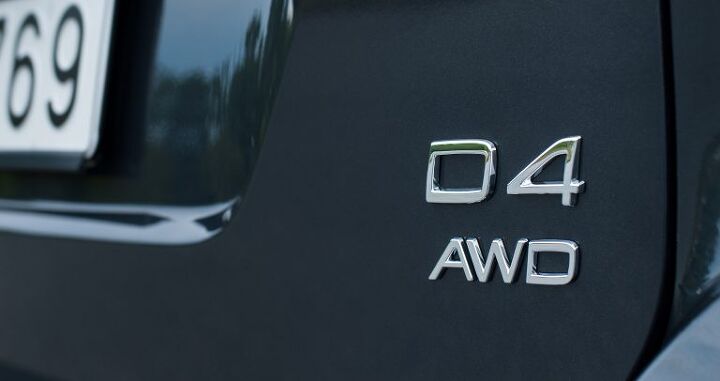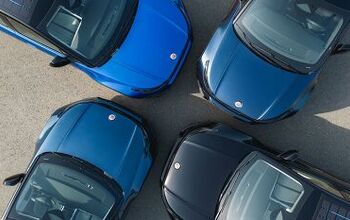Volvo Won't Pursue Diesel Development Any Further Than It Already Has

Volvo Cars is prepared to lower the curtain on diesel engines. Rising standards for nitrogen oxide emissions — and the cost associated with reducing them — has guided the automaker away from oil burners and into the loving arms of gasoline. “From today’s perspective, we will not develop any more new generation diesel engines,” CEO Hakan Samuelsson told Germany’s Frankfurter Allgemeine Zeitung.
That is not to suggest Volvo won’t get some serious mileage out of its last batch of diesels, though. The automaker has no plans to abandon the motors outright, suggesting it could march onward with its current lineup for at least a few more years. Diesels would also help Volvo meet corporate fuel economy targets while it gets new super-economical electric powerplants ready for market.
“We have just launched a brand new generation of petrol and diesel engines, highlighting our commitment to this technology. As a result, a decision on the development of a new generation of diesel engines is not required,” Samuelsson said in an interview with Reuters.
However, that commitment only goes so far as to update the existing VED4 and VED5 mills to keep them compliant through roughly 2023 — when Volvo feels confident it will no longer need them. Their replacements will come in the form of hybrid and electric units, with the first BEV arriving in 2019. While the company has dabbled with diesel-hybrid powertrains, they’re unlikely to persist, especially considering its new four-cylinder policy. The D5 Drive-E hybrid has been scolded for being costly without much added performance value and Volvo knows North America would rather see pure electric anyway.
“We have to recognize that Tesla has managed to offer such a car for which people are lining up. In this area, there should also be space for us, with high quality and attractive design,” Samuelsson explained.
He also said costs are becoming a serious impediment to diesel desirability, especially in Europe where most are sold. Volvo has to be careful how it plays its hand. Samuelsson noted that nine of every 10 XC90s sold in Europe are produced with diesel engines and about half of all new European vehicles are registered as diesel models. But with the European Union clamping down on carbon dioxide emissions and bans on diesel vehicles cropping up in a handful of cities, it makes little sense to pursue the technology for another generation.
The EU’s current mandate has CO2 fleet emissions dropping from 130 grams to a scant 95 by 2021, and the best way to do that is to pass the carbon buck to a power station by building more electric vehicles.

A staunch consumer advocate tracking industry trends and regulation. Before joining TTAC, Matt spent a decade working for marketing and research firms based in NYC. Clients included several of the world’s largest automakers, global tire brands, and aftermarket part suppliers. Dissatisfied with the corporate world and resentful of having to wear suits everyday, he pivoted to writing about cars. Since then, that man has become an ardent supporter of the right-to-repair movement, been interviewed on the auto industry by national radio broadcasts, driven more rental cars than anyone ever should, participated in amateur rallying events, and received the requisite minimum training as sanctioned by the SCCA. Handy with a wrench, Matt grew up surrounded by Detroit auto workers and managed to get a pizza delivery job before he was legally eligible. He later found himself driving box trucks through Manhattan, guaranteeing future sympathy for actual truckers. He continues to conduct research pertaining to the automotive sector as an independent contractor and has since moved back to his native Michigan, closer to where the cars are born. A contrarian, Matt claims to prefer understeer — stating that front and all-wheel drive vehicles cater best to his driving style.
More by Matt Posky
Latest Car Reviews
Read moreLatest Product Reviews
Read moreRecent Comments
- Lou_BC Well, I'd be impressed if this was in a ZR2. LOL
- Lou_BC This is my shocked face 😲 Hope formatting doesn't fook this up LOL
- Lou_BC Junior? Would that be a Beta Romeo?
- Lou_BC Gotta fix that formatting problem. What a pile of bullsh!t. Are longer posts costing TTAC money? FOOK
- Lou_BC 1.Honda: 6,334,825 vehicles potentially affected2.Ford: 6,152,6143.Kia America: 3,110,4474.Chrysler: 2,732,3985.General Motors: 2,021,0336.Nissan North America: 1,804,4437.Mercedes-Benz USA: 478,1738.Volkswagen Group of America: 453,7639.BMW of North America: 340,24910.Daimler Trucks North America: 261,959


































Comments
Join the conversation
Let the Diesel Death Watch commence.
I think that the diesel death watch (DDW) began months ago when the VW Cheat news broke.